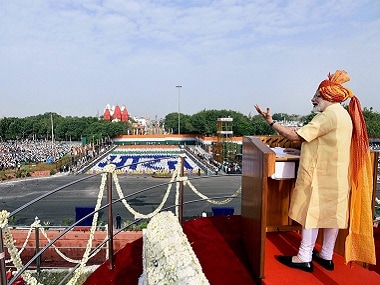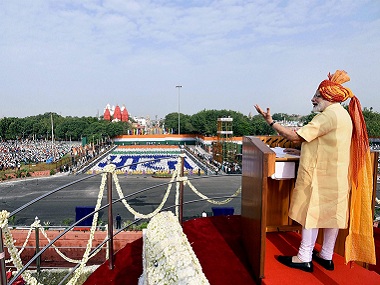Over the last few days, my email inbox and the messages folder on my mobile phone have been inundated by communications from the Prime Minister’s Office, urging me to share my thoughts via the Narendra Modi app or the MyGov portal on issues I want him to touch upon during the 71st Independence Day speech. The prime minister apparently received over 10,000 suggestions from citizens across the country, giving him ideas and topics, covering diverse fields like black money, education, environment, jobs, digitisation of the economy, etc. The idea behind this elaborate exercise was simple: Making democracy more participatory and hammering into the masses that everyone is an equal partner in the nation-building process. And this motif was evident throughout Narendra Modi’s speech on the occasion of India’s 71st Independence Day. In a relatively short 56-minute address, the prime minister exhorted the citizens several times — sometimes urging them to make sacrifices — to create a ‘New India’. [caption id=“attachment_3934179” align=“alignleft” width=“380”]  Narendra Modi addressing the nation from the historic Red Fort on the occasion of the 71st Independence Day. PTI[/caption] A ‘New India’ was central not only to Modi’s discourse but was also reminiscent of President Ram Nath Kovind’s maiden speech to the nation on Monday. There was remarkable interplay between the two speeches. Kovind spoke of a house for every family, on-demand power, better telecommunication, modernisation of infrastructure, upgradation of road and railway networks, rapid and sustained growth, and a compassionate society. Modi invoked cricket terminology and urged ‘Team India’ to run for ‘New India’ by 2022, by which time he promised, the poor shall have pucca houses, access to electricity, healthcare, sanitation and education, farmers’ incomes shall double, there will be ample opportunities for the youth and women, and India would be free of scourges such as communalism, casteism and terrorism. This symbiosis wasn’t accidental. It is the fructification of a grand scheme that was envisaged as soon as Modi rose to power to 2014. Relentless focus on winning elections led to BJP bagging key states, which in turn lent the party considerable legislative muscle. This subsequently led to greater strength in the Rajya Sabha, which ensured the election of Ram Nath Kovind and Venkaiah Naidu as president and vice-president respectively. With apparatchiks cornering two top constitutional posts, and the possibility of dissenters in its ranks being ruled out, it appears that the government is now ready to go full steam ahead. For, this accumulation of power was necessary for Modi, to be unchallenged by dissent before sending out a message to voters. In his various public speeches and election rallies, Modi has indicated that he visualises at least two terms for himself, if not more. A crucial part of getting re-elected is to place himself as the automatic choice before the electorate. This is where synergy between prime minister and president comes into play. In two public addresses on consecutive days, both the prime minister and the president set certain goals and parameters to be achieved by 2022, presumably the year by which ‘New India’ should emerge. This repeated stress on 2022 sends a subconscious message to the electorate that Modi has a lot of unfinished business which he hopes to complete by that time, and that his reelection is necessary for nation-building. This creates a huge distance between him and his rivals, because now the voters see a personal stake in ensuring that Modi retains power. Concurrently, Modi also fashions himself as the builder of a new India, and wants to introduce a new modus vivendi in the way government interacts with the people. It was clear from Tuesday’s Red Fort address that the “nationalism” motif will be set within a moral framework. The prime minister’s stress on honesty was significant. It has been the subject of much research why and how Modi has emerged unscathed — even increased his political capital — despite putting the poor and the middle class through the grind during demonetisation and GST. But what has escaped most analyses is that this was possible because the steps were presented not simply as grandiloquent ideas but within the twin parameters of morality and sacrifice, where pain is necessary for shuddhi. This was once again evident on Tuesday, as Modi claimed that a premium has, at last, been attached to honesty and those who are law-abiding and scrupulous will no longer feel these are moral burdens. Equally, he added that the dishonest who cheat on paying taxes or looting from the poor will lose their sleep. This stress on morality, along with the prime minister’s exhortations of shunning the chalta hai attitude and cynicism and adopting new hope to build ‘New India’ presents the new modus vivendi where — as Modi put it — tantra se lok nahin, lok se tantra chalein (democracy will be driven by people, not the other way round). In other words, “Modi the nation-builder” is merely a representative of the people and the transformational change will be driven by them, not him. The prime minister is a great orator and it is easy to see what he is doing here. He is suggesting that the sarkar is no longer this unimagined, , oppressive force symbolised by convoyed ministers, unresponsive bureaucrats or huge, graying institutions, but a prime minister who does not depend on institutions to deliver his job. In short, he is the government. And he is responsive to people. Professor Christophe Jaffrelot, in an article on The Indian Express, describes this rhetorical technique as “inherent in populism, a version of politics that crystallises when a leader tries to relate directly to ‘his’ nation, circumventing institutions in the worst-case scenarios”. Modi spent a fair amount of his address reiterating the achievements of his government and vowed to complete 99 schemes before 2019. But by far, his speech was remarkable for the way he seems to be concretising his plan for a second-term. Given the uncertainties of voter behavior, only a very confident or a reckless man will venture to take a re-election for granted. No prizes for guessing which category Modi falls into.
In a relatively short 56-minute address, Prime Minister Narendra Modi exhorted the citizens several times — sometimes urging them to make sacrifices — to create a ‘New India’
Advertisement
End of Article


)
)
)
)
)
)
)
)
)



